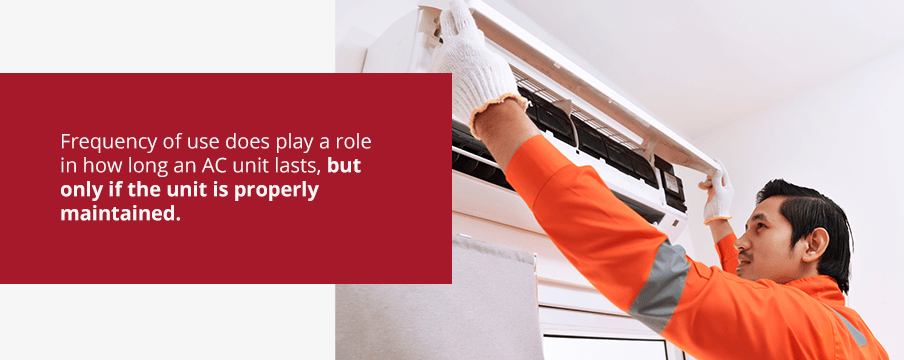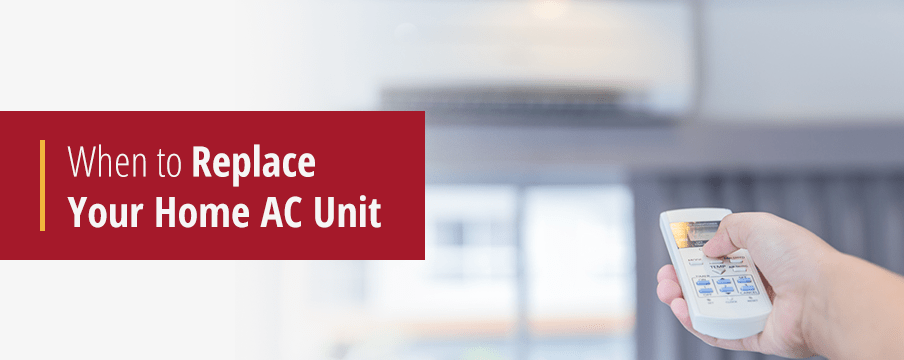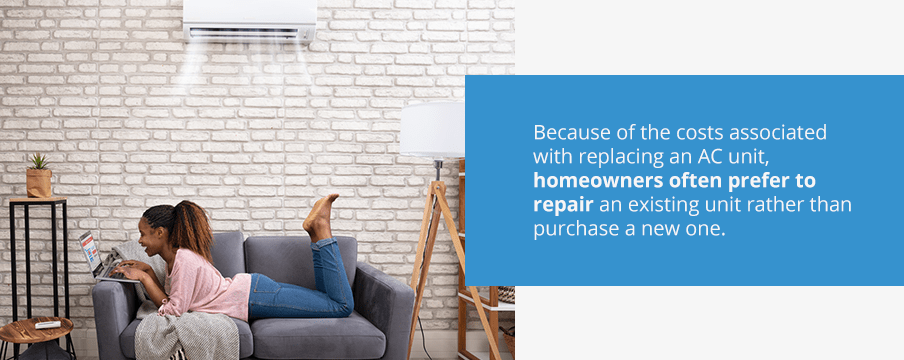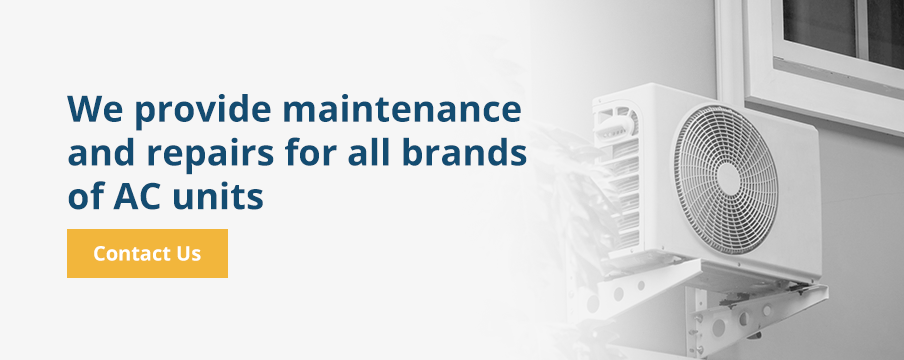Table of Contents
- When Should I Replace My AC Unit?
- How Many Years Should an Air Conditioner Last?
- How Much Does it Cost to Replace a Home AC Unit?
- Repair vs Replacement: Cost Comparison
- When Should You Replace Your Home AC Unit?
About 75% of homes in the United States rely on air conditioners to maintain a comfortable temperature in their homes. Central AC units are so common that we often take them for granted — until they stop working.
Whether you’ve noticed a slow decline or you wake up one morning to a hot, humid house, a broken or poorly functioning air conditioner can be a sign that it’s time to replace your unit. But how do you know when it’s time to replace it? And is it more efficient to repair an existing unit than replace it?
These are the signs that your AC unit is reaching the end of its life, as well as what you should do when you recognize these signs.
When Should I Replace My AC Unit?
An AC unit should last an average of 12 to 15 years. It’s important to notice that this number is only an average. With proper maintenance, some AC units will last longer. Others, for a variety of reasons, may not make it that long. So what are the signs you need a new air conditioner?
1. High Energy Bills
Have you noticed your energy bills creeping up? One or two higher-than-average bills aren’t necessarily a sign of a problem — especially if the upward trend happened during the summer months — but if you see a steady increase over time, then this is a good sign that you should replace your HVAC system. The best way to detect an upward trend is to compare bills from the past couple of years to get a feel for how much energy you’ve been using and how much you’ve paid as a result.
In some cases, your energy bills may skyrocket because it’s been a hotter-than-average summer. Or, the energy company may have raised its rates. But if you see an upward trend that isn’t due to fluctuations in rates or the weather, then your AC unit might be to blame.
Why?
If your AC unit is more than 10 years old, it’s using a lot of energy to operate. This is because the last decade has seen significant changes in the way HVAC systems are built and operated. A new, high-efficiency system rated by ENERGY STAR can save you up to 20% on your energy bills.
2. Frequent Problems
If your HVAC specialist is on your phone’s speed dial, then that may be a sign that your AC isn’t doing well. It’s a good idea to schedule annual maintenance, and occasionally breakdowns happen, but if you notice your AC unit requires frequent service to keep your home cool, then it might be a sign your air conditioner needs to be replaced.
But consider more than just the frequency of the problem — also consider the nature of the problems and the repairs that have been required to address them. Regular maintenance doesn’t mean your unit is old. In fact, we recommend regular maintenance on units of all ages to prevent the need for excessive repairs later. But if you’ve had a lot of broken parts or ongoing issues with leaks, then it’s probably time to consider a new central AC unit.
3. Changes to Your Home’s Square Footage
AC units come in different sizes — the bigger the home, the bigger the unit you’ll need to cool your space efficiently. If you recently completed an addition or finished off a previously unfinished basement or attic space, then your current AC unit may not be big enough to keep up with the new demands you’ve placed on it.
If you’re renovating or contemplating a renovation in the near future, it’s a good idea to talk with a professional about your current AC unit and its ability to handle the changes you’re about to make to your home. Besides preventing efficiency problems down the road, knowing what to expect in advance will help you as you budget for the upgrades you’re planning.
4. Fluctuating Humidity in Your Home
AC units are designed to cool the air inside of your home, as well as pull excess humidity from the air. If your unit isn’t operating as it should, then it might not be efficiently pulling moisture from the air. Signs that your AC unit isn’t adequately pulling moisture from the air include mold around your home, moisture around the windows or a muggy feeling inside of the house.
How Many Years Should an Air Conditioner Last?
Although most AC units last 12 to 15 years, there’s not a perfect way to predict how long they’ll last. While the numbers do help you know what to expect, the lifespan of an AC unit depends on more than just averages.
What contributes to wear and tear on an AC unit?
1. Incorrect Sizing
If your home is operating an AC unit that wasn’t properly sized for your house, then your unit may be working inefficiently to compensate. If an AC unit is too big for the house it’s trying to cool, it will engage in “short-cycling,” which means it will turn on and off quickly. This puts a lot of strain on the compressor — the most vital part of the whole system. Eventually, this could result in a broken compressor. In an AC unit that is no longer under warranty, a broken compressor costs so much to repair that it’s usually more cost-effective to replace the whole unit.
Likewise, a unit that’s too small for a home will work harder — without successfully cooling your home — and therefore wear out faster.
2. Frequency of Use
How much you use an AC unit will also contribute to its longevity. If you live in an area where you’re using AC most of the year, your unit will naturally wear out sooner than a unit that’s only engaged a few months in the summer. This is especially true if you live in a hot climate, like the southwest United States. AC units in homes located in cooler climates don’t typically get as much use, which means that they may last longer than average under the right conditions.
3. Proper Maintenance
Frequency of use does play a role in how long an AC unit lasts, but only if the unit is properly maintained. Unfortunately, many homeowners believe that if their AC unit is running, it must be working efficiently. However, this isn’t always true. Regular maintenance is important to make sure that AC units continue to run efficiently and to detect and repair small problems before they become big problems.

4. R-22
Changes to government regulations regarding the coolant used to operate HVAC systems have made AC units manufactured before 2010 increasingly expensive to maintain and repair. This will quickly increase the cost of maintaining an older unit over replacing it with a newer one.
Why are the costs so much higher to repair an older unit?
R-22, also commonly known as “Freon,” was a popular refrigerant used for cooling in AC units until 2010. But R-22 was found to contribute to the depletion of the ozone layer, so it has been replaced with a safer option that won’t have such a negative impact on the environment. The U.S. government recognized that it would take some time to phase out AC units that relied on R-22, so they set deadlines for changes in the manufacturing and maintenance of these units.
As of January 1, 2020, it became illegal to import R-22 into the United States, meaning supplies are extremely limited and technicians who are certified to work with this refrigerant are fewer and more expensive. If you have an older unit that requires maintenance or repairs involving R-22, it will be more difficult and more expensive to have these repairs made. Because of this, it may be more cost-effective to replace your older unit with a newer model sooner rather than later.
How Much Does It Cost to Replace a Home AC Unit?
The cost to replace an AC unit in a house depends on a variety of factors.
1. Size of Your Home
An AC unit’s capacity to cool is measured in British thermal units (BTUs), which is basically the measurement of the amount of energy needed to heat or cool the water running through the system. That capacity is then translated into the unit’s size, measured in tons. The larger your home, the larger the AC unit you’ll need to cool your entire home efficiently. For example, a 1,000 square foot home will require a unit that operates at 18,000 BTUs per hour, which requires a 1.5-ton unit. Larger homes will require a unit with more BTUs — and therefore greater tonnage — to cool all the living space properly.
2. Condition of Ductwork
Although it’s easy to find pricing for an AC unit itself, there are often additional costs associated with installation. In some cases, your existing ductwork may not be in good condition or it may not be sufficient to run your new unit effectively. If your installer has to repair or replace ductwork, this can increase the cost of replacing a new unit. Depending on what needs to be done to bring the ductwork up to code or where it’s located, you might see additional costs beyond the AC unit itself.
3. Replacement vs. Upgrade
If you’re living in an older home, you may be upgrading to a new central AC unit as your replacement. If that’s the case, then there will be additional costs associated with installing ductwork, air returns and receptacles around the house. In some cases, the installers may also need to install upgraded circuits to support the new unit.
Repair vs. Replacement: Cost Comparison
Because of the costs associated with replacing an AC unit, homeowners often prefer to repair an existing unit rather than purchase a new one. In the short-term, this may seem like a better financial option. But, in some cases, you may actually end up spending more money over time to maintain an older unit rather than replace it. How do you decide whether to repair or replace an AC unit?
To determine the best route when it comes to HVAC repair vs. replacement, ask yourself these questions:
1. What’s the Problem?
In some cases, your AC unit may not be operating correctly — or at all — because it requires maintenance or a simple repair, such as a clogged filter or worn parts. These issues are typically simple to fix and don’t indicate that a unit needs to be immediately replaced. On the other hand, if your unit has broken down repeatedly in the last few months or a substantial leak is detected, then it’s better to put the money into a new unit rather than paying for these costly repairs.
2. How Much Will It Cost to Fix?
In general, AC unit repairs cost less than a new unit. However, the costs vary depending on the nature of the repair. For example, it’s relatively simple — and inexpensive — to replace a filter. But if the unit’s compressor is broken, then you’ll be shelling out a lot of money to fix it. There’s no magic number that indicates when it stops being worth it to pay for repairs, but you should always compare the cost of the repair to the cost of a new unit. If the repair is going to cost a significant portion of the cost of a new unit, then it’s more financially beneficial to put that large amount of money toward a new, energy-efficient unit.
3. How Old Is My AC Unit?
If your unit is less than 10 years old — especially if it’s still under warranty — then it’s probably more cost-effective to repair the problem. If your unit is older, then you’ll probably continue to spend to keep it running properly. If you upgrade to a new unit, you can put that money toward the cost of a replacement and you’ll also start saving money on your monthly energy bills.
When Should You Replace Your Home AC Unit?
Sometimes it will be obvious that it’s time to replace your home AC unit. Other times, the answer might not be quite as clear. Let A/C Contractors help you make the call. As a full-service heating and AC contractor serving the Longview area, A/C Contractors technicians have the training and experience necessary to provide you with all the information you need to make an informed decision. We provide maintenance and repairs for all brands of AC units, and we are proud to offer the installation of a variety of AC units, depending on your needs and budget.
We offer repair and maintenance, as well as 24-hour emergency assistance. If your AC unit isn’t cutting the heat, give us a call at 903-759-4250 or request an estimate online today.










